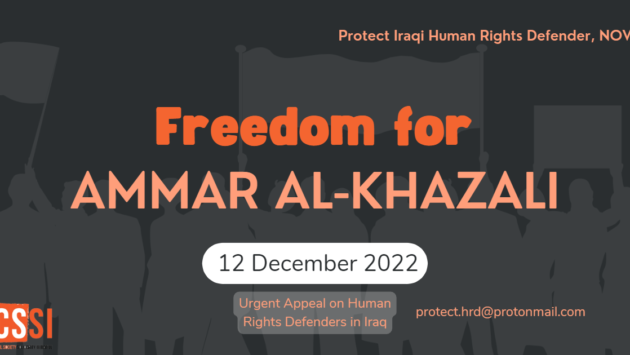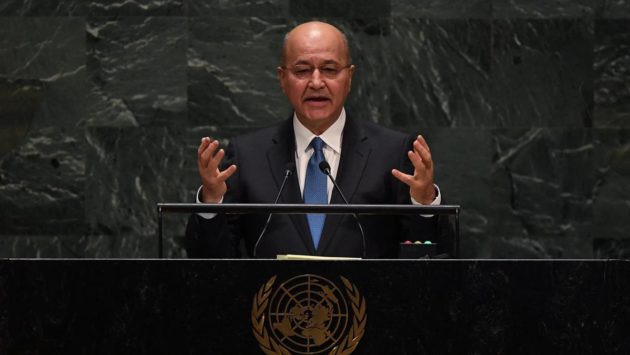Shams Network Report to Monitor the Elections of Parliament Cancellation of Voting for Iraqi Residents Abroad
Background on monitoring Iraq’s 2021 parliamentary elections
Since 2005, Iraq has had several electoral experiments and Shams network has played an active role in monitoring the elections as one of the most prominent institutions of Iraqi civil society and its contribution to supporting the transparency and integrity of the elections through the monitoring programs and reports it has issued, in addition to its proposals and opinions in the procedures of electoral processes.
For the 2021 Iraqi parliamentary elections, Shams network has prepared a program of work to monitor the full cycle of Iraqi elections, which was implemented by the self-efforts of the network and its member organizations and with the partial support of the French and Dutch Embassies, Konrad-Adenauer-Stiftung and the Elections Network in the Arab World (ENAR).
Iraqi experience of abroad elections
Democratic countries have been keen to involve their citizens outside the borders of the motherland in voting in various forms, to ensure the rights of their citizens and their participation in public life, and the applications of this process came not long after the transformations in understanding the participation and expansion of the elections, including the United States, the United Kingdom, Germany, Austria, Australia, Belgium, Canada, Denmark, Sweden, Spain, France, Italy, Japan, the Netherlands, Norway, Switzerland, Turkey, and others, in addition to the Arab countries such as Algeria, Tunisia, and Lebanon.
Perhaps what is in the interest of the democratic experience in Iraq is that it implemented the program of including expatriate Iraqis in the first free democratic elections held in Iraq after the fall of the tyrannical regime, which was the elections of the National Assembly in 2005 and by relying on the efforts of the International Organization for Migration(IOM)and then established the Independent High Electoral Commission based on its expertise in the program of electing the parliament for Iraqis abroad.
In fact, the achievements in the process of elections for Iraqis abroad would not have been possible without the support and provision of the host countries of the program by providing logistical, security and technical support in some cases and allowing expatriate Iraqis to exercise their rights under international human rights conventions, as well as supporting and backing up the international electoral assistance team.
The mechanism to determine the countries where elections are held abroad for Iraqis
The countries where the elections are held in cooperation with a number of Iraqi institutions and International organizations are determined by adopting the criteria below:
Criterion 1: The number of Iraqis residing in the country concerned and according to available statistics.
Criterion 2: The possibility of Iraqis travelling from some of their countries of residence (where polling stations have not been opened) to neighboring countries where elections are held (e.g. Scandinavia).
Criterion 3: The agreement of the states concerned to hold elections on their territory.
Criterion 4: Previous elections experiences, and the number of voters in each country.
Thus the number of countries in which elections will be held and the number of voters in each country are determined.
The number of countries at each electoral stage was determined as follows:
• Number of states in the 2005 National Assembly elections (14) states
• Number of states in the 2005 parliament elections: (16) states
• Number of states in the 2010 parliament elections: (16) states
• Number of states in the 2014 parliament elections:(20) states
• Number of states in the 2018 parliament elections: (21) states
Implications of the decision to cancel the vote of voters living abroad in parliamentary elections
In a move that sparked widespread debate about its constitutionality, Iraq’s Independent High Electoral Commission (IHEC) decided to cancel the vote of electors living abroad on October 10th parliamentary elections, for technical, legal, financial, and health reasons. Political and popular groups in Iraq were divided between supporters of the decision of the Council of Commissioners of the Electoral Commission and a rejection of the decision to take from Iraqis abroad the right of participate in the elections.
Reactions to the decision varied, with opinions and reactions as follows:
1- “The first step would prevent fraud and reduce the waste of public money.” “We bless the move of the Independent High Electoral Commission; we call it a valid and irreparable decision and we appeal to the Commission to take other similar decisions to ensure the integrity and independence of the electoral process.”
2- “The problem we suffered in the elections abroad is the large number of frauds that took place and this was a direct reason to press for their abolition.”
3- Overseas voting in the legislative elections for 2018 was marred by suspicions of fraud and vote-rigging, which some political forces and parliamentary blocs considered a “lifeline” for those who did not win votes in the internal elections because of their declining popularity.
4- “IHEC’s justifications are illogical and technically and administratively unacceptable, so it must review this decision, which is as if it tells citizens abroad that they are not the compatriots and they do not have the right to self-determination,” he said.
5- “This decision is incorrect and lacks legal basis,” he said, adding that “severing the link between Iraqis who have been forced to leave the country does not benefit the political process.”
6- “Constitutionally, every Iraqi has the right to vote, which is indisputable, and a clause in the electoral law has been specified indicating that the Commission has updated the records of Iraqis abroad, with their elections being exclusively in the biometric, as well as the displaced and the security services.”
7- “We found that IHEC was unable to carry out modernizations and issue biometric cards because of the spread of the Corona pandemic in those countries, and therefore we have a compelling reason not to involve citizens abroad.”
8- “Although the lack of elections abroad is unconstitutional, it is required as a de facto”: “There are many reasons, including the political crisis that Iraq is going through, which needs to win the confidence of the voter, and the voice of the outside does not represent the reality of the tragedy suffered by the citizen at home”, that: “Elections abroad are financially costly and have a great waste of public money, as well as a wide area of manipulation and fraud, and therefore it is difficult to ensure their integrity”
9- This decision will neglect about four million Iraqi votes living in the diaspora, which constitutes a high percentage of those entitled to vote, and this decision means not even paying attention to the formal aspect, in addition to the substantive aspect of the election process, pointing out that in any case what matters to IHEC is to reach results consistent with the interests and dominance of the ruling political forces, by working in a suppressed and controlled environment that is not existing in the Iraqi immigrant environment.
10-The election commission’s decision to cancel voting for Iraqis abroad, most of whom suffer from forced displacement, is not their desire to leave their homeland and properties, exposing themselves and their families to risk. There are important areas where people are not allowed to return to their homes from which they have been forcibly displaced, which means that this decision is an explicit violation of the current constitution and election laws, and constitutes a major blow to democracy, which has great observations within Iraq.
11-“It is not necessary to hold elections abroad for Iraqis who live there permanently,” he said, noting that “from past experience, the participation of overseas voters is less than 10 percent in all previous elections.”
12-That: “The decision of the Board of Commissioners is contrary to the law that expressly stipulated that it should be held, and the Commission argued that the reason for the cancellation of the elections abroad is due to time constraints and the difficulty of opening accounts and others, i.e. the legitimacy of the cancellation is based on the theory of emergency circumstances and this is a convincing justification for its cancellation.”
13-The decision of the Electoral Commission is courageous, that the elections abroad were accompanied by the sale, purchase, forgery, and waste of funds.
14-The cancellation of the vote abroad has stopped a great deal of money wasted and the dangerous door of fraud and manipulation. “Those who are keen to vote are prepared before the elections.”
15-that the vote of Iraqis living abroad is not a bounty or charity from anyone and many countries in the region do so,
16-The Electoral Commission, by deciding to cancel the elections abroad, has proved unable to meet the challenges of some powerful political blocs and the inability to secure transparent elections.
17- Most Iraqis have no hope that the elections will lead to the desired change because they do not trust the current political system, the urgent need to develop a new socio-a political contract that will draw up a road map for the country’s administration, and the political system in the next phase.
https://www.iraqicivilsociety.org/wp-content/uploads/2021/09/Elections-Abroad-Final-English-3.pdf




